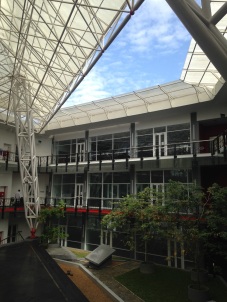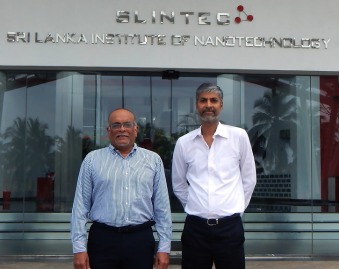Innovation has played a significant role in economic development in many advanced economies. A critical component of achieving this has been investment in research and development, which has contributed to created technologically advanced products and improving competitiveness of these countries. Nanotechnology –the engineering of functional systems at the molecular scale – appears to be a microcosm of the global innovation ecosystem. The National Nanotechnology Initiative which commenced in 2008, has aspired to develop a world-class environment for nanotechnology, research, innovation and commercialization, developing human resources needed for the Sri Lankan innovation landscape and promote industry oriented collaborative research and development.
In this interview, Harin de Silva Wijeratne, CEO of Sri Lanka Institute of Nanotechnology – SLINTEC (and member of the Chamber’s NAC on the Innovation Ecosystem) and Professor Gehan Amaratunga, Chief of Research & Innovation at SLINTEC and Professor of Engineering at the University of Cambridge, speaks to Shenali de Silva, of the Ceylon Chamber of Commerce on the role of nanotechnology in economic development and projects which can positively impact the country’s transformation.
 At the outset of the discussion, Harin emphasized that the research projects currently undertaken at SLINTEC are likely to take nearly a decade to enter the market, as it is a trial and error process and perfecting products in a nascent market requires continuous investigation. In terms of economic development, both Gehan and Harin discussed in detail the research projects underway which address the challenges of Sri Lanka’s agriculture sector. Partnering with some of the leading corporates in the country, SLINTEC has been addressing three key areas in agrichemicals – using effective fertilizers, withdrawing from using harmful pesticides and fungicides. The institution aims to obtain patents for these products which will provide a base from which corporates can add value to their products and eventually enter the export market. Professor Amaratunga also emphasized the importance of high yield crops, and nanotechnology’s intervention of managing the entire plant’s biostructure to obtaining higher yields.
At the outset of the discussion, Harin emphasized that the research projects currently undertaken at SLINTEC are likely to take nearly a decade to enter the market, as it is a trial and error process and perfecting products in a nascent market requires continuous investigation. In terms of economic development, both Gehan and Harin discussed in detail the research projects underway which address the challenges of Sri Lanka’s agriculture sector. Partnering with some of the leading corporates in the country, SLINTEC has been addressing three key areas in agrichemicals – using effective fertilizers, withdrawing from using harmful pesticides and fungicides. The institution aims to obtain patents for these products which will provide a base from which corporates can add value to their products and eventually enter the export market. Professor Amaratunga also emphasized the importance of high yield crops, and nanotechnology’s intervention of managing the entire plant’s biostructure to obtaining higher yields.
Furthermore, Harin talked about SLINTEC’s partnership with the Export Development Board in early 2016, which paved the way for setting up “science clinics” that help exporters’ research and development activities. While the science clinics have successfully completed research reports on markets such as tea, pepper and the packaging sector; Harin observes that the Sri Lankan industry has a trading mentality and is not quick to invest in R&D. One of the key learnings from this initiative has been the need to firstly create awareness of the need for research  before delving into it. As he observes that a conversion from consultation to investment in research projects takes place about 15 months after initial consultation, therefore the benefits that are to be yielded by these science clinics are likely to see fruition a few years into the future.
before delving into it. As he observes that a conversion from consultation to investment in research projects takes place about 15 months after initial consultation, therefore the benefits that are to be yielded by these science clinics are likely to see fruition a few years into the future.
While a plethora of benefits are to be yielded from the application of nanotechnology, the appetite for risk investments, required for funding research has been significantly low. Furthermore, the lack of scientist focused on commercial research as opposed to academic research has been a significant constraint to the industry. The inadequacy of qualified and experienced human capital has been continuously discussed across multiple forums and is a key action item for the National Agenda Committee on Innovation Ecosystem.


